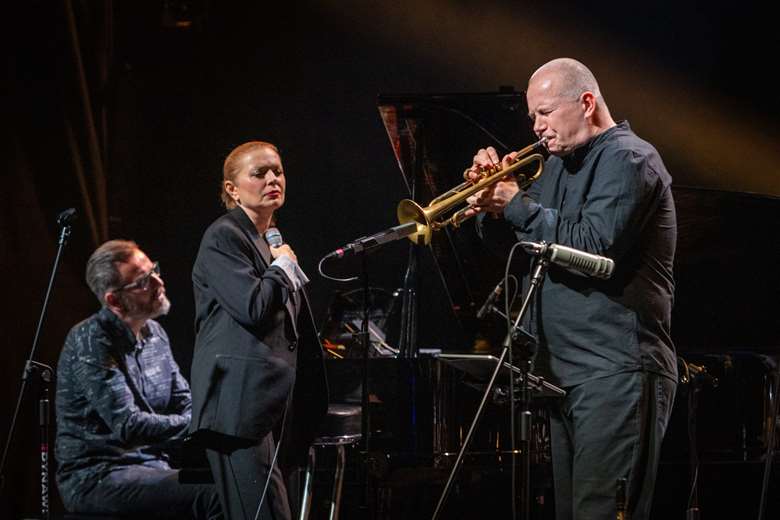The 10th edition of Szczecin Jazz celebrated Jazz Forum’s award-winning Polish masters
Martin Longley
Wednesday, April 16, 2025
Martin Longley combined Szczecin’s daytime World Jazz Network conference with its evening gig-flow…

Photo: Sebastian Wołosz
Some festivals are totally public, while others are designed as industry showcases, but nowadays there are increasing hybrid degrees, where these two beasts are harnessed together. Szczecin Jazz is usually completely public, but in its 10th year it hosted a four-day conference insert, courtesy of the World Jazz Network, including a gala performance of awards given by the 60-years-old Jazz Forum magazine, the Polish equivalent of Jazzwise. This happened at the bright white Filharmonia, the city’s swanksome concert hall, with its distinctive architectural carapace making the building look like it could be wheeled off to another location in times of emergency.
The Marcin Wasilewski Trio began as mainstream early-achievers, with their history of working with the revered trumpeter Tomasz Stańko. Since his demise, they now boast a significant presence themselves, though often working in a subdued, introverted fashion. Then there were awards for individual elders: Maciej Sikała (tenor saxophone) and Grzegorz Nagórski(trombone) who appeared in front of the Wasilewski Trio, delivering their appealing mainline sound, but getting harder, taking off with individual solos, slick and assured. A restful number opened the Wasilewski set, with the second bringing on Sikała to ignite the proceedings. Nagórski followed, providing his own lusty solo.
At the other end of the scale is the EABS crew (Electro-Acoustic Beat Sessions), a youngish assemblage from Wrocław, who combine improvisation and groove, featuring trumpet, tenor saxophone, keyboards, electric bass and drums, plus a barrelful of effects. A steppin’ funk propulsion is powered by springy drum cross-cuts, with tenorman Olaf Węgier also using a small keyboard to aid with the dubby space blossoms, and Kuba Kurek releasing powder-pockets of bright trumpet-scribing.
Singer Aga Zaryan began her set with just upright bass accompaniment, for ‘Loverman’, exposed and stark, with a drummer added for the second song, Wasilewski returning on piano. Zaryan held a steely focus, with her slow mulling over words. The horns also returned, turning this into a full complement for the closing stretch. The artist prizewinners happened to provide a micro-overview of several Polish jazz scenes, from electrified pulsing back to classic song-craft.
Two nights later there was another surprise highlight in the shape of trumpeter Piotr Wojtasik, who pretty much sold out the grand Teatr Polski. Despite your scribe’s continuing immersion in the Polish scene, Wojtasik’s performance came as a highly impressive introductory revelation, the entire audience clearly mesmerised by the potency of his expressively dark moods. Wojtasik’s band were deliberately garbed in low-key gear, ranged across the stage in a concentrated, deeply serious configuration. They created a subtle, morose style, loaded with intensely expressive solo statements, alongside theme formations of steadily rising poignancy. Singer Anna Maria Jopekarrives from a non-jazz background, bringing a vocal style that seeped melancholic cabaret deepness, the polar opposite of the chirpy goodtime jazz chanteuse. This was a gothic wasteland of underplayed drama. For a non-Pole, observing, the teaming of this pair clearly had a particular resonance in the entertainment world, and when they kissed each other at the end, an audible gasp ran through the audience, a frisson of vicarious excitement.
The World Jazz Network comes across as a smaller version of the dominant Europe Jazz Network, involving a closely-entwined clutch of festivals that weave webs of artistic exchange: including Sicilia Jazz, Jazzfest Budapest, the Amersfoort World Jazz Festival in the Netherlands, and Szczecin itself. As well as participating in the panel discussions, each artistic director brought along a representative band, and sometimes appeared in the line-ups themselves.
The next night, still in the Filharmonia, tough tenor blower Alexander Beets (also artistic director of the Amersfoort fest) guested with his pair of invited Dutch bands, similar players led by singers Baer Traa and Graziëlla Hunsel Rivero, the latter’s set being preferable (despite her having had too many singing lessons), as the former was neither grounded in the jazz or blues zones, but rather some cheery pseudo-New Orleans hinterland, despite some good, fleeting choices of Mark Murphy and Les McCann material. Beets assuredly improved the parts of each set where he was onstage, steeping the songs with a raw groove outpouring of vintage coolness, and egging on his trumpet and co-tenor partners.
In the Radio Szczecin studio, two more festival-connected combos played in the late afternoon. Electric bassist Fabio Lannino presented his Chick Corea concept show, My Spanish Heart, which was much more impressionistic than most such ventures, with a poetic beatnik narrative from Nick The Nightfly, who runs the Blue Note in Milan, but is a transplanted Glaswegian. Stories and songs were woven together in a luminescent Sicilian lounge-cabaret (Lannino also runs Sicilia Jazz). ‘Spain’ was a clear highlight, but much of the music wasn’t so redolent of Corea’s style, and this performance was more about his words and anecdotes rather than attempting to reproduce his music.
The best set from a festival invitee came next, with Jazzfest Budapest presenting The Péch Lórán Trio, led by piano, with bass and drums accompaniment. They were quite mainline in style, but heartily swingin’, with a nervously asymmetrical bass solo revealing an imaginative and pugilistic approach from Sándor Suke, full of detail and momentum, just with Tamás Fazekas’s drum undertow. Then it was only piano and bowed bass, Lórán becoming more rhythmically adventurous, almost Brubeckian.
Each evening was crowned by the nightly jam session at the Radisson Blu hotel, where the WJN conference took place, with the excellent One Voice core combo providing an ongoing backing. Four female vocalists led the band (singly) over four nights, ably supported by a house band that included guitarist Jakub Miseraki (soon, you will know him), with bassist Dominique Sandersand drummer Owen Hart Jr. (a mighty Stateside rhythm-pairing team). A lively vibration pervaded, with several of the guesting players managing to surpass their actual ‘official’ gig performances, bestowed with their special midnight energies.